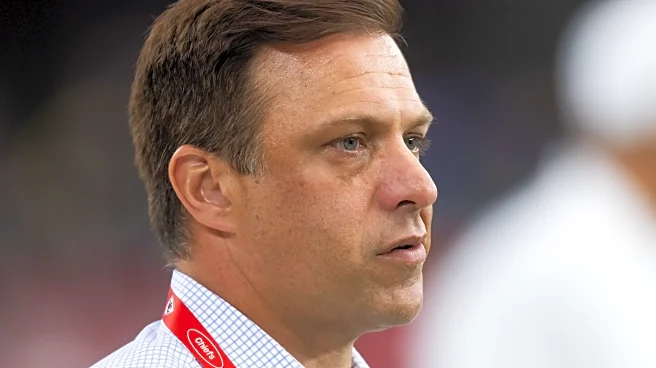What's Happening?
Adam Driver, known for his role as Kylo Ren in the 'Star Wars' sequel trilogy, revealed that his proposal for a movie centered on his character, Ben Solo, was rejected by Disney. Driver had spent two years developing the concept, which was set after the events
of 'The Rise of Skywalker.' The project, titled 'The Hunt for Ben Solo,' was developed with filmmaker Steven Soderbergh and writer Scott Z. Burns. Despite Lucasfilm's initial interest, Disney executives Bob Iger and Alan Bergman declined the project, citing the character's fate in the existing films as a major obstacle. Driver expressed disappointment, noting that the script was one of the best he had been involved with.
Why It's Important?
The rejection of Adam Driver's project highlights the challenges of expanding established franchises like 'Star Wars' while maintaining continuity with existing storylines. This decision underscores the influence of corporate decision-making in creative processes, particularly in large franchises where character arcs are tightly controlled. For fans, this represents a missed opportunity to explore a beloved character further. The decision also reflects the broader industry trend where creative pitches must align with existing narratives and commercial strategies, potentially stifling innovative storytelling.
What's Next?
While Driver's project will not move forward, the 'Star Wars' franchise continues to expand with new films and series. Upcoming projects include Jon Favreau's 'Star Wars: The Mandalorian and Grogu' and Shawn Levy's 'Star Wars: Starfighter.' These developments indicate that while some creative ideas may be shelved, the franchise remains a significant focus for Disney, with new stories and characters being introduced to keep the universe vibrant and engaging for audiences.
Beyond the Headlines
The shelving of Driver's project raises questions about the balance between creative freedom and corporate oversight in major film franchises. It also highlights the potential for fan disappointment when beloved characters' stories are left unexplored. This situation may prompt discussions about how franchises can innovate while respecting established narratives, and whether there is room for alternative storytelling approaches that could satisfy both creative ambitions and corporate objectives.

















